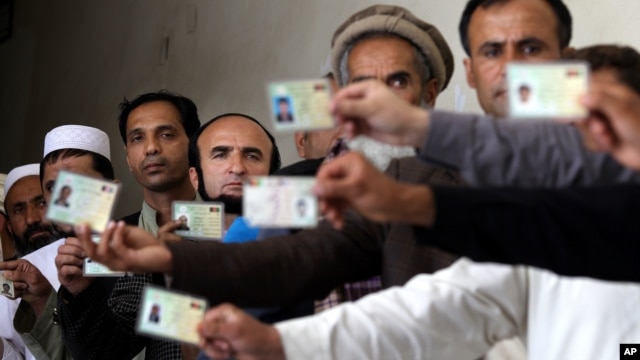
Afghan men display their identification cards as the wait to cast their votes outside a polling station in Kabul, Afghanistan, Saturday, June 14, 2014.
KABUL — Polls in Afghanistan have closed and vote counting has started for the run-off election between presidential candidates Abdullah Abdullah and Ashraf Ghani.
Afghans went to the polls Saturday to decide whether former World Bank official Ashraf Ghani or former foreign minister Abdullah Abdullah will be the next president of their war-ravaged nation. Despite ongoing violence, voters in Kabul ignored threats and streamed past heavy security to cast their ballots.
The explosions started in early morning, rocking different neighborhoods of Kabul. But the renewed violence did not stop thousands of people in the capital from heading to their local polling stations to vote.
One young first-time voter, Sheikayba Alokozy, said the bombs were not enough to interrupt the election.
She says, we want peace in Afghanistan, and we want a complete change in the country, we are not scared of anybody the enemy, no matter how much they attack us, we will not run away and we will cast our ballots.
Outside the polling centers, the streets were empty except for armed police walking on patrol or riding in pickup tricks. Most voters walked to their local polling centers. The few drivers on the street were stopped and questioned.
Minister of the Interior Mohammed Omer Daudzai warned that the threat of militant violence was high. But he said the country’s security forces were ready.
“The level of threat is higher than what was in the first round, but on the other hand it is also a fact we have gained far more experience and we have far more better equipment and we are in a much better position to prevent any possible attack by terrorists,” he said.
None of the presidential candidates in the first round of voting on April 5 won more than 50 percent of the ballots, forcing Saturday’s runoff election between the top two candidates, Ashraf Ghani and Abdullah Abdullah.
By mid-morning there was a steady stream of voters in the capital. Polling center officials said turnout was high, but voters in Kabul and the major southern city of Kandahar said there were fewer people casting their ballots than in the first round.
For those who did turn out, such as Haji Gholam Gilani, the chance to vote was too important to miss.
He says, this election is important not just for me, but also for the future of my children. This vote will decide the future of the country for the next five years, and that is why I am here.
Both Ghani and Abdullah sent tens of thousands of party observers around the country to guard against fraud. Hundreds of international observers were deployed mainly in Kabul. U.N. special envoy to Afghanistan Jan Kubis said it was up to local monitors to ensure a clean election.
“International observers can only complement the effort of the domestic observers,” said Kubis.
Afghanistan’s Independent Election Commission and Complaints Commission have said they will review all reports of voting irregularities. Officials have said it is crucial that the vote is credible, so that the results are acceptable to the Afghan people.
Early reports had come in of a suicide bombing and centers running out of ballots in the south, and fights breaking out between supporters in the north. There also were reports of scattered attacks around the country, but no major disruptions to the vote.
The Taliban claimed they had carried out more than 240 attacks across the country. The militant group often exaggerates and there was no independent verification of its claims.
Whoever wins the vote will succeed current President Hamid Karzai and lead Afghanistan for the next five years.
|
|
